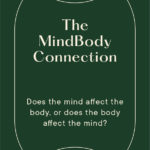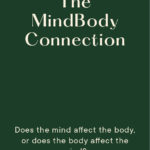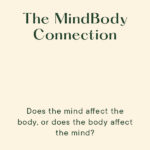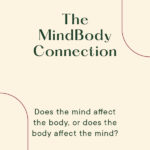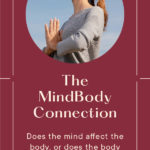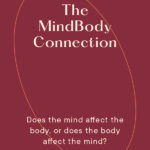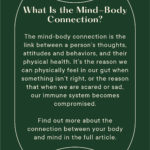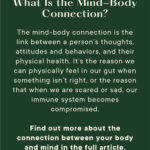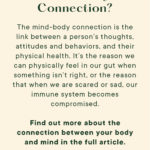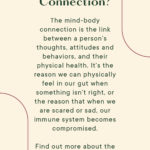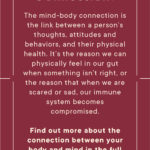Does the mind affect the body, or does the body affect the mind? It’s a bit like the “Which came first, the chicken or the egg?” debate. Your mind reacts to stimuli in its environment and relays that information to the brain, then the brain decides what to do and how to react, sending instructions down to the body. It’s a wonderful symbiotic relationship… until the communication fails.
The mind-body connection links a person’s thoughts, attitudes, behaviors, and physical health.
While scientists have long understood that our emotions can affect our bodies, we’re just now beginning to understand how emotions influence health and longevity.
The mind-body connection is an important component of holistic medicine, which is a healthcare philosophy that seeks to treat the whole person, not just their symptoms.
It’s what our coaching is based on inside the Your Daily™ Health Coaching app—you are not a sum of individualized parts—you are a whole person.
While we still have a lot to learn about the mind-body connection, there’s no doubt that taking care of our mental health is good for our physical health as well. However, the mind-body connection isn’t just about how the mind affects the body—it’s also about how the body affects the mind.

The history of the mind-body connection.
Awareness of the mind-body connection is by no means new. From the dawn of humankind to approximately 300 years ago, virtually every system of medicine throughout the world treated the mind and body as a whole.
But during the 17th century, the Western world started to see the mind and body as two distinct entities. In this view, the body was like a machine, complete with replaceable, independent parts, with no connection to the mind.
With this shift came the increased focus on treating the localized symptoms instead of the person as a whole. It also put significant emphasis on the brain and its governing abilities over the body.
The body was seen as a servant to the brain. “I think, the body does” became the logic to how the body worked.
This Western viewpoint has definite benefits, acting as the foundation for advances in surgery, trauma care, pharmaceuticals, and other areas of allopathic medicine. However, it also greatly reduced scientific inquiry into humans’ emotional and spiritual life and downplayed their innate ability to heal.
In the 20th century, this view gradually started to change. Researchers began to study the mind-body connection and scientifically demonstrated complex links between the body and mind.
Studies around Polyvagal Theory, the Microbiome Project, and the Gut-Brain Axis, are providing an understanding of how the body and the mind are intrinsically connected and how they communicate through a superhighway of nerves and bacteria.

What this means for you
This is all exciting news because there are numerous syndromes and diseases with which conventional allopathic medicine wasn’t making any headway. Medicating away the symptoms would last for a while and then go back to how it was before, or seemed to have no effect on symptoms at all. Gut issues and auto-immune disease have been particularly difficult to cure, but luckily that is changing.
Studies are proving again and again that through caring for our bodies both in our Primary Foods (community, relationships, finances, creativity etc.) and our Secondary Foods (nutritional foods that we eat), our bodies can heal a number of illnesses and problems without the help of drugs and medicine.
If you are struggling with unexplained symptoms or symptoms that don’t seem to get better no matter what you do, we invite you to try the Your Daily™ Health Coaching app. It contains a library of exercises and courses to help you reconnect the mind and body and regulate the nervous system.
Read next: What is a Health Coach?






